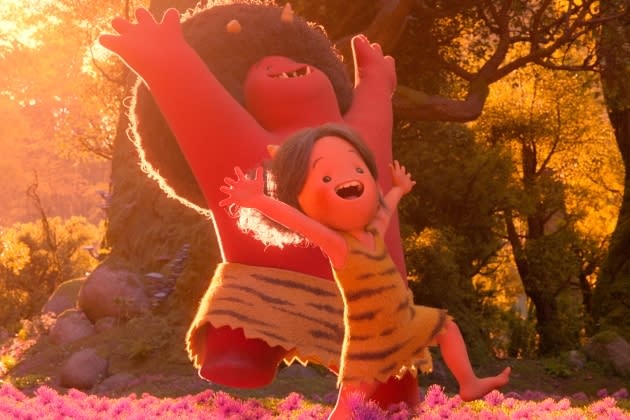Tonko House Delves Into Japanese Folklore in Netflix Limited Series ‘Oni: Thunder God‘s Tale’
- Oops!Something went wrong.Please try again later.

When Netflix debuts the limited animated series “Oni: Thunder God’s Tale” on Friday, Oct. 21, it will be the culmination of a longtime goal for creator-director Daisuke “Dice” Tsutsumi to bring characters from Japanese folklore to a global audience.
“Oni,” written by Mari Okada and Tsutsumi, follows the story of Onari, a free-spirited girl living in a world of strange gods and monsters who is determined to help save her village from a looming threat. It features an international cast of voices including Momona Tamada as Onari, “Jojo Rabbit” star Archie Yates as her best friend Kappa, Craig Robinson as her protector Naridon and George Takei as her teacher Mr. Tengu.
More from Variety
Tsutsumi and his Tonko House partner Robert Kondo first talked with Variety about the project in early 2019 but the genesis of the idea began earlier than that. “It was about five years ago when Robert asked me, if I could draw anything, what would it be? So, I drew characters from Japanese folklore,” Tsutsumi recalls. “It’s been a long-time dream, working in this industry as a Japanese native, to make a story about Japanese culture from an authentic Japanese voice. I thought that would be impossible, but then I did this drawing. Robert thought it was great and, slowly, we started to make a story out of it. Then, to our surprise, Netflix showed an interest in telling this story very authentically from a cultural perspective.”
The result is a lush-looking CG-animated limited series that looks as thought it’s been animated in stop-motion. In fact, the project was originally going to be produced in stop-motion.
“In the beginning, in early development, we worked with a stop-motion studio called Dwarf and actually did some visual tests in actual stop-motion with practical sets and real puppets,” explains Kondo, who is production designer on Oni as well as an executive producer along with Tsutsumi and Kane Lee.
“Stop-motion has a tactile quality. Those worlds feel so instantly believable, so that became the high mark for us going into CG to be able to recreate the feeling of those worlds,” Kondo says. “We really design around emotion and the warmth of these worlds and characters. The source material for everything we create is sort of similar, but the path we took for ‘Oni’ was very, very different than what we’ve done in the past.”
Tsutsumi and Kondo are known for the painterly quality of their work. After leaving Pixar, they gained recognition for their 2014 animated short “The Dam Keeper,” which was nominated for an Academy Award, and opened their own banner, Tonko House. The filmmakers hope “The Dam Keeper” can become a full-length feature one day and have created graphic novels based on the short and spun off characters into a Japanese Hulu series called “Pig: The Dam Keeper Poems,” written and directed by collaborator Erich Oh.
The production of “Oni” was already planned to be a global affair to a degree pre-pandemic and lockdown ended up making it a necessity. “Even before the lockdown, a majority of production was being planned to be in Japan,” Tsutsumi explains. “It was important for us to collaborate with animators and CG artists in Japan because it’s a Japanese story. So, it was going to be remote no matter what.”
As it turned out, their producer, Sara K. Sampson, brought deep remote production experience to the project. “This isn’t why we brought her in, but Sara has incredible experience in previous productions that were all remote, so when the pandemic started, she did not bat an eye and capitalized on the fact that we were a small studio. What this allowed us to do during the pandemic was reach out to top talent all over the world,” Kondo says. “I really have to commend her for orchestrating this incredible team that was working in different time zones. We never felt we were missing quality. Culture was built through Zoom, through really thoughtful interactivity, and putting extra time and care into those invisible spaces where culture is built.”
While “Oni” is being presented as a four-episode limited series, Tsutsumi and the Tonko House team think of it as “one big 154-minute story cut into four chapters,” Tsutsumi says. “Our hope is that people watch the whole thing at once. That’s how we made it.”
Tsutsumi and Kondo hope the partnership they’ve forged with Netflix continues and that they can share more tales from the world of “Oni.”
“The creative team at Netflix collaborated with us in such a way that it gave us complete creative autonomy plus their incredible support. I can’t stress enough how much we needed Netflix to be able to make ‘Oni.’ It was an amazing partnership and I hope we get to work together again,” Tsutsumi says. “We’re excited to expand on the story of “Oni’ at some point.
“I hope that this is just the first story that we’re telling in this world,” adds Kondo.
Below, Tonko House shares a video on the inspiration behind “Oni.”
Best of Variety
The Best Pop Culture Halloween Costumes for 2022: From 'House of the Dragon' to 'Euphoria'
Constance Wu Gets Candid in Revealing New Memoir 'Making a Scene'
Sign up for Variety’s Newsletter. For the latest news, follow us on Facebook, Twitter, and Instagram.
